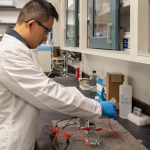
Metal-air batteries are longer lasting than the often-used lithium-ion batteries found in electric cars.
University of Central Florida researchers are working to improve energy sources for zero-emission, electric vehicles that are an environmentally friendly alternative to combustion engines.
In some of their latest work, published recently in the journal Energy & Environmental Science, the researchers detailed how they stabilized platinum atoms for use in large-scale production of metal-air batteries.
Metal-air batteries are longer lasting than the often-used lithium-ion batteries found in electric cars.
Platinum must be stabilized to work as an effective catalyst to jump-start electrochemical reactions that store energy in the batteries. Platinum-based batteries are safer than the fire-prone, lithium metal designs.
“We controlled the composition of the materials, and therefore have platinum atoms stabilized in the alloy nanosheets,” said Yang Yang, an assistant professor in UCF’s NanoScience Technology Center and study co-author.
The research builds on Yang’s recent work that demonstrated ways to reduce the amount of the expensive metal platinum needed in these battery designs.
The work was supported by a National Science Foundation grant.
Coauthors included Zhao Li with UCF’s Department of Materials Science and Engineering and NanoScience Technology Center; Wenhan Niu with UCF’s NanoScience Technology Center; Zhenzhong Yang and Yingge Du with Pacific Northwest National Laboratory; Nusaiba Zaman and Abdelkader Kara with UCF’s Department of Physics; Widitha Samarakoon, Maoyu Wang, Marcos Lucero, Manasi V. Vyas and Zhenxing Feng with Oregon State University; and Hui Cao, Hua Zhou and George E. Sterbinsky with Argonne National Laboratory.
Yang holds joint appointments in UCF’s NanoScience Technology Center and the Department of Materials Science and Engineering. He is a member of UCF’s Renewable Energy and Chemical Transformation Cluster. Before joining UCF in 2015, he was a postdoctoral fellow at Rice University and an Alexander von Humboldt Fellow at the University of Erlangen-Nuremberg in Germany. He received his doctorate in materials science from Tsinghua University in China.
Original story by UCF Today